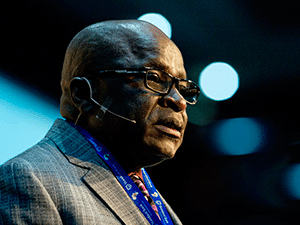
[miningmx.com] – SOUTH Africa’s Department of Mineral Resources (DMR) would report back on the 2014 audit into mining charter compliance “early next year”, said the country’s mines minister, Ngoako Ramatlhodi.
In terms of the mining charter, mining companies operating in South Africa were given ten years from 2004 to sell 26% of their equity, or units of production, as well as comply with a number of other deliverables relating to social and labour plans, procurement and employment equity.
Commenting during a press conference on the sidelines of the Joburg Indaba conference, Ramatlhodi said it was still necessary to “agree on what was compliance” before the process was complete.
“We don’t want to pre-empt the process,” said Ramatlhodi. “We have to agree what constitutes compliance and what doesn’t so there are no quarrels over the outcomes.”
In February, former mines minister, Susan Shabangu, said the audit would be finished in November this year.
The “harshest” measure of non-compliance would be to withdraw the mining licence owned by mining companies, but Ramatlhodi said the audit “shouldn’t start there … You explore and try to understand. Any measures that we can take to assist with the industry to comply…” need to be considered, he said.
One of the issues that is likely to be debated during the audit is whether the DMR supports the principle of ‘once-empowered, always-empowered’. The concern in the mining sector is that mining companies will be asked to re-empower themselves in the event a partner dissolves or sells its shares in the company.
Responding to questions during a speech to the Joburg Indaba, Ramatlhodi said that the issue of once-empowered, always-empowered was “a relevant question”. But he added that “the other side of the coin … was that we should not see black entrants into the industry as a favour”.
He later said calls from the Gauteng arm of the African National Congress for an increase in empowerment ownership to 49% were something that would be discussed.
“I have listened to the debate, but I have decided not to engage too much. The time will come because that is a proposal in the National General Council [of the ANC].
“We will have enough time to look at those policies. I understand the logic. Lets make sure participation of black people in the economy is real and not seen as a burden,” said Ramatlhodi.
AMENDMENTS
Ramatlhodi said there had been no decision yet on whether the proposed amendment bill to the Minerals and Petroleum Resources Development Act (MPRDA) would be returned to the South African parliament for further discussion.
“We have since made representations to the President [Jacob Zuma] and I’m sure he will make a decision very soon [on whether to sign into law or send the MPRDA amendments back to parliament”.
He added that if the proposed amendment bill was returned to parliament there would be “full engagement with all stakeholders”.
“We do not want a situation of cold comfort where we arrive at amendments that remain contested elsewhere in the political structures,” said Ramatlhodi who added that if the bill was returned to parliament it would be because there were questions about its constitutionality.










